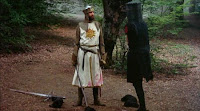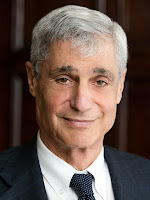Apr. 29,
1985—After promising as late as spring training that he would let Yogi Berra
manage the New York Yankees for the entire season, principal owner George Steinbrenner abruptly fired him before the first month had even ended.
The cause
was not misconduct, a breakdown in relations with players, or defiance of the
man the media had nicknamed “The Boss,” but a 6-10 record following an 87-75,
second-place 1984 finish.
Berra’s
replacement, Billy Martin—hired for the fourth time—didn’t produce the
desired result, either, going 91-54, good for an overall 97-64 season—leaving the
Bronx Bombers second once again in the American League East division. Forget about
a pennant, the minimum that the Boss expected: Martin couldn’t even get the
team into the playoffs.
Though
Berra did not express anger initially (“He’s the boss, he can do what he wants”),
at some point his dismissal began to gnaw at him. It wasn’t until years later
that his grievance was aired: after 30 years with the organization, he felt
that Steinbrenner owed it to him to deliver the bad news himself rather than to
entrust the dirty job to General Manager Clyde King.
And so,
the Yankee great—a Hall of Fame catcher, coach, and manager beloved by
teammates, players, and fans—vowed to boycott all Yankee-related functions for
as long as Steinbrenner remained in charge of the organization.
Fourteen
years passed before Berra relented. In the process, he accomplished something
remarkable: He became perhaps the only employee in the Steinbrenner Era to get
the better of the Boss.
With each
passing year—even with the team winning World Series again after a decade
without even being in the playoffs—Steinbrenner suffered a public-relations
embarrassment for his cavalier treatment of the most visible remaining link to
the DiMaggio-Mantle dynasty.
At last,
with Yankee radio announcer Suzyn Waldman as a diplomatic go-between, the
standoff concluded with Steinbrenner showing up at the opening of the Yogi Berra
Museum and Learning Center in Montclair, NJ. All the way over from the Bronx to
the museum, the owner had never looked so nervous, an associate recalled later,
according to this 2015 article by the New York Times’ Harvey Araton.
But in a
short meeting behind closed doors, Berra got what he wanted: an apology.
Think of
it: a powerful man forced to travel abjectly to the turf of the one who had
brought him to heel. How often does that happen?
Quite
apart from the shabby treatment of the lovable Berra, was his removal
warranted? Did the results justify it? To both questions, I would answer no,
for these reasons:
*The
three most important Yankees that year—Don Mattingly, Dave Winfield, and Rickey
Henderson—were, at that point, still not at full strength because of injuries.
In other words, this team had not yet started to fire on all cylinders, but it would
do so shortly—if only Steinbrenner had given it a chance. In short order, they
were about to become an offensive powerhouse this season.
*One
complaint that Steinbrenner had voiced about the squad in the past few weeks—a “lack
of discipline” on the field—was spurious. In addition to the three players
mentioned previously, this Yankee team featured veterans like Don Baylor, Ken Griffey
Sr., Ron Guidry, and Phil Niekro. Motivation and self-discipline were not
problems for this group.
*The removal
continued to destabilize a team in desperate need of a calming influence. This
was the 12th managerial change since Steinbrenner had taken over the
club in 1973. The players liked and got along with Yogi.
*Speaking
of “destabilizing,” Martin was about to fall into familiar habits. Martin
favored a fast, aggressive style of play that had become known as “Billy Ball.”
But sometimes his non-traditional style of play could backfire. That’s what
happened late in the year, when he sent third baseman Mike Pagliarulo to the
plate to bat right-handed, late in a crucial September game against the Detroit
Tigers—even though “Pags” was not a righty, or even a switch-hitter. The move failed.
Worse, as Steinbrenner’s carping predictably picked up again, the alcoholic Martin
got into one of the barroom fights that had come to mark his career as player
and manager, this time with his own pitcher, Ed Whitson. While Martin ended up
with a broken ulnar bone in his right arm, his inconsistent but high-priced
starter came away with a broken rib and fractured hand.
*If
Martin was overrated as a manager, Berra was underrated. Martin’s
insistence on complete games by his starters effectively killed on the best
young rotations in baseball when he managed the Oakland A’s following the 1981
season. He might have produced immediate improvements for the teams he managed,
but the gains were temporary, as he exhausted the patience of owners and
players alike. On the other hand, Berra had already managed two pennant-winning
teams that probably shouldn’t have even made it that far. In 1964, he had
managed a proud but aging team of Yankee sluggers to the seventh game of the
World Series before they fell to the St. Louis Cardinals. In 1973, with Rusty
Staub—a productive but not traditional cleanup hitter—batting fourth, he took
the Mets to the World Series, too—even knocking off the powerful Cincinnati
Reds in the playoffs before falling to the Oakland A’s in the Fall Classic.
With his
10 championship rings, Berra had long been loved by Yankee fans not just as an
important contributor to the team’s success but also as a colorful character
famous for malapropisms—sometimes real, sometimes invented by others—that became
known as “Yogisms.” His often basic, awkward communication skills led
sportswriters particularly to underestimate his knowledge of pitchers and feel
for the game.
But the
long cold war with Steinbrenner enhanced the respect with which he was held.
For years, it had been the pugnacious Martin who had garnered sympathy for his
fights with the owner, even though it had often been manifested in boorish,
self-defeating antics.
But, by
standing stubbornly on principle without acting out, it was now Berra who had
become an object of sympathy, as well as a stand-in for anyone who had to
endure a bumptious, bullying boss. When the dust had settled, though no longer
working on baseball, he had become the beloved elder statesman of the Yankees,
a position he retained until his death 10 years ago.
(The image
accompanying this post, of Yogi Berra in 1984, was made available by the New
York Yankees via tradingcarddb.com.)
















-WC.jpg)



